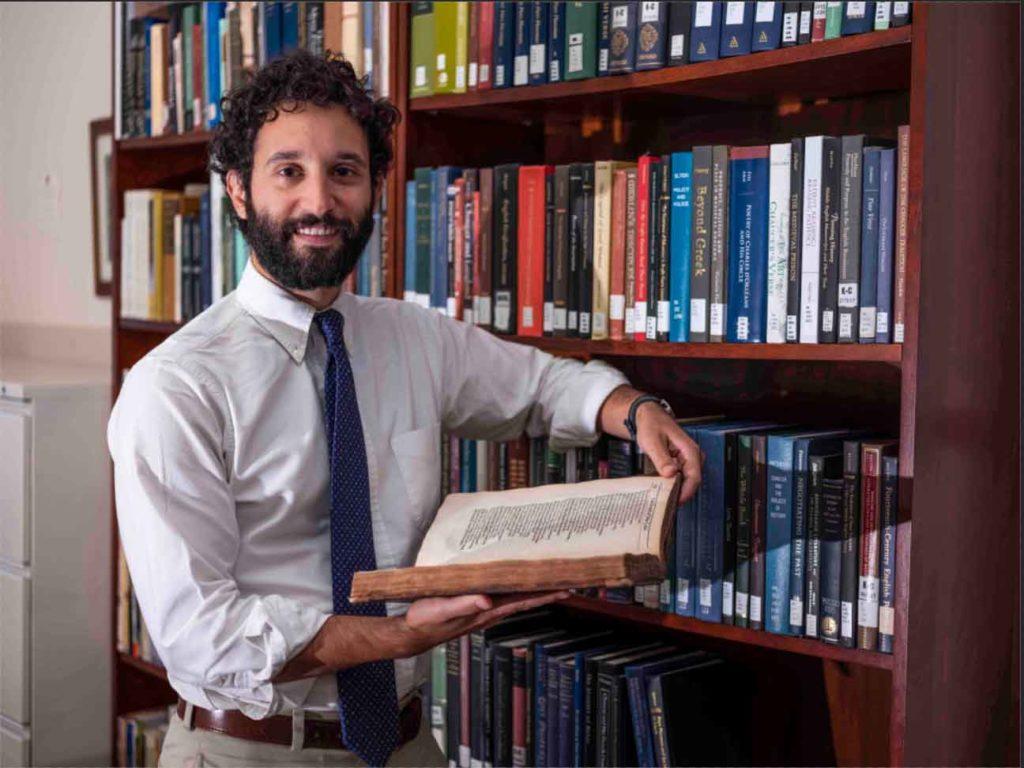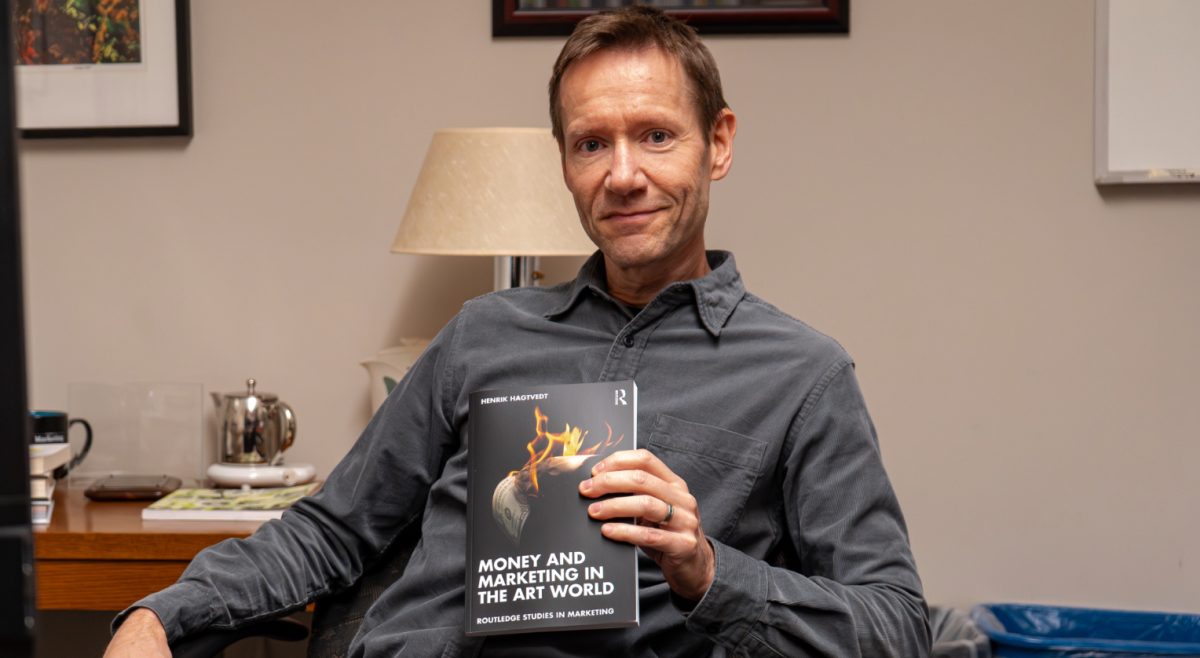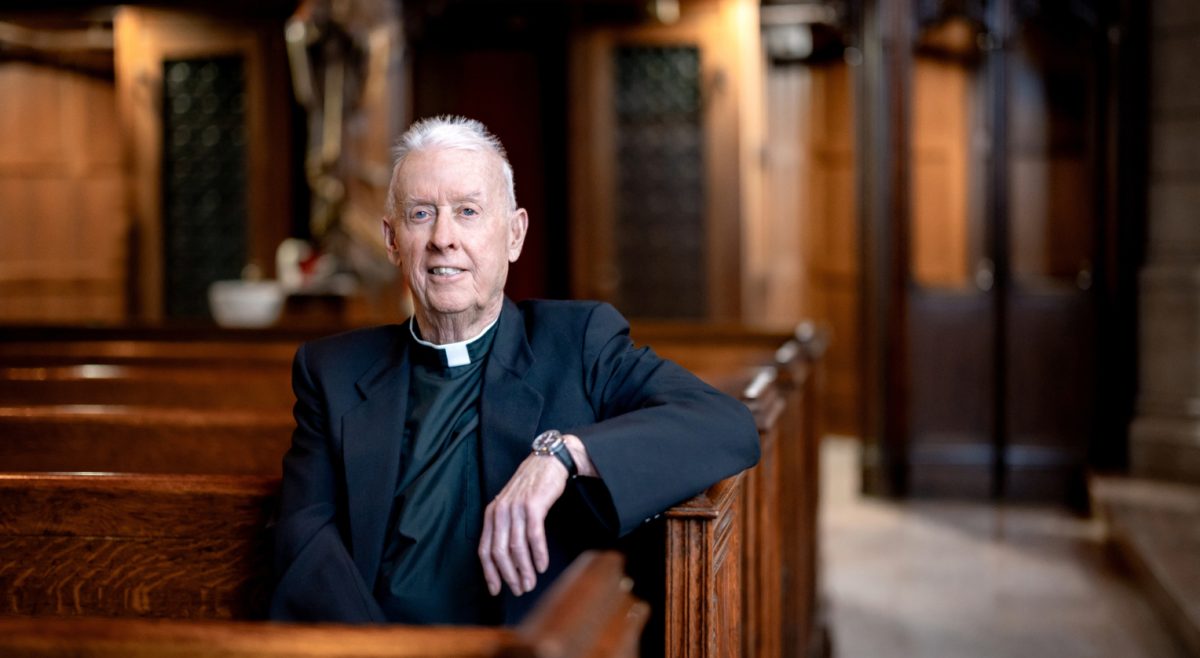When he’s not grading papers or teaching classes, English professor Eric Weiskott can be found on the internet, trolling “Chaucer Doth Tweet,” the Twitter account dedicated to the 14th-century poet known to some as the father of English literature, and looking at medieval memes to tweet from his own Twitter-verified account.
In the past few years, Weiskott has been published in various publications including The Atlantic, The Conversation, and The Chronicle of Higher Education. A string of articles directed at the general public about medieval literature, as well as a lot of attention centering around one of his more well-known pieces,“Millennial Bashing and Medieval Times,” generated enough buzz that Twitter decided to anoint Weiskott with the coveted blue-check mark to signify that he was Twitter-verified.
Chuckling as he scrolled through the Chaucer account’s page—which is mainly filled with jokes in Middle English—Weiskott explained how he uses Twitter to help students interact with texts from centuries ago in a modern way. He finds a lot of value in Twitter, viewing it as a powerful network that can be used as a means of connecting people in academia from all over the country, as well as an effective tool that allows his students to take what they learn in his courses and bring the material out into the world.
“It’s the language of Chaucer that’s challenging—the culture is distant from us in time and space, and that is definitely a challenge I face, but I love that,” Weiskott said. I love convincing students that Middle English is really fun.”
Middle English refers to English of the years 1100 to1450, which is marked by a variety of dialects. It’s similar to Modern English, but is also vastly different, as seen in the first line of Chaucer’s Canterbury Tales, “Whan that Aprille with his shoures sote / The droghte of Marche hath perced to the rote, / And bathed every veyne in swich licour, / Of which vertu engendred is the flour; / Whan Zephirus eek with his swete breeth.”
For those that are skeptical of the extent to which Middle English, a difficult language to conquer, can be amusing, Victoria Ang, MCAS ’20, can quell all fears. Having taken Weiskott’s Introduction to British Literature course, in which she came to appreciate his teaching style, Ang returned in the spring for a challenge in Weiskott’s Middle English Alliterative Poetry class.
“It felt like the stuff we read was literally not in English,” said Ang. “We would have to translate it with a glossary he gave us and match words in the texts we were assigned—which I know sounds boring and specific, but with him it was so much fun and I really enjoyed it.”
Weiskott, who grew up in Greenport, N.Y., spent many of his formative years delving into English language and literature in college. He attended Wesleyan University as an undergraduate where he double majored in English and classical civilization. While Weiskott went to college with the intention of majoring in English, he says that the addition of classical civilization happened by “accident,” after he took an interest in Greek and decided to tackle the last few remaining credits for the major.
“The summer before I started college I read, or tried to read, Chaucer because my parents had a book lying around and I thought it was kind of fun to try to figure out Middle English, which was the language Chaucer wrote in in the 14th century,” Weiskott said.
Following his first attempt at deciphering Chaucer, Weiskott continued to explore medieval literature at Wesleyan, which ultimately solidified his interest in the subject matter. Following his undergraduate studies, Weiskott went on to Yale University where he obtained his P.h.D in English. Upon completion of his P.h.D. and dissertation on Medieval Alliterative Poetry, which went on to become his first book, Weiskott began applying to jobs and was able to obtain his first choice—a position at Boston College.
“Boston College is a unique place in that it is a research university that is focused on the undergraduate liberal arts, which is a great combination in my opinion,” said Weiskott.
Weiskott said that the BC’s ability to provide resources in the way that large research institutions do—while at the same time keeping the focus on both faculty and funding undergraduate liberal arts education—is one of the biggest factors that drew him here.
Now entering his fifth year of teaching, Weiskott continues to retain the same passion and interest in teaching students at BC both about English and the world—and using medieval literature as his vehicle to do so. At BC, Weiskott’s classes have focused on his interests in Chaucer and medieval literature and poetry. He offers a range of courses from Studies in Poetry to Middle English Alliterative Poetry to a class solely dedicated to analyzing the works of Chaucer—in which students carry around a book the size of their heads and watch movies like Monty Python and A Knight’s Tale to examine topics like medievalism. In addition to teaching undergraduate and graduate courses, Weiskott is also the director of the Master of Arts Program in the English department.
Now, having been in the BC bubble for a few years, Weiskott remarked that the type of student that BC attracts plays a role in why he chose to stay.
“I also really like how service-oriented the students are here,” said Weiskott. ‘I find that extremely refreshing and admirable.”
Weiskott applauded his students not only for their commitment to their academics, but also their abilities to excel in being well-rounded people with involvement in extracurriculars and service. Admiration and appreciation run both ways between Weiskott and his students.
Students like Ang find Weiskott to be an accessible resource in the classroom and beyond. In the case of Ang, who is an economics and English double major, she finds that across the two disciplines, Weiskott was the first professor that she felt she was able to foster a relationship with because of his enthusiasm to work with students one-on-one. She admitted that when she signed up to take his Middle English Alliterative Poetry course, she was wary of the subject material.
“Again I didn’t really know what to expect, and like I said my interests are not really focused in older literature, but because the class was with him, I thoroughly trusted that the class would be interesting,” said Ang.
Within the classroom, Weiskott quells students’ doubts and fears with his enthusiasm for the subject. Weiskott works hard to connect students to the material that at first seems distant from their modern, iPhone-wielding selves, by incorporating modern technology into his classroom.
One of his current projects is the development of his website Mapping Chaucer that was built using a special website creator specific to BC, Media Kron. While he and his undergraduate research assistant Francesca Williams have partially created the foundations of the website, filling in the points of Chaucer’s biographical life, Weiskott has left an area of the website blank so that later in the semester his students can fill in the gaps on the map of the Canterbury Tales and contribute.
“I saw a chance with this map tour feature to do something different because Chaucer’s life and his writings are not only about England, but they are about Asia, Africa, the entire world,” Weiskott said.
His students have also received attention from Genius.com—a digital media site, originally known as “Rap Genius,” in which people can provide annotations to songs and works similar to Chaucer’s. Students are required to annotate portions of The Canterbury Tales for Weiskott’s class, contributing their knowledge to the world wide web to help others learn.
Weiskott hopes that helping the students interact with Chaucer’s texts digitally will add another dimension to their understanding of his writings. The digital aspect of the project also allows for the possibility for people beyond BC to view the material and use it as a resource, something that excites Weiskott as he sees that digital media creates a unique opportunity to share work in the humanities.
“I really enjoy the Media Kron work because it is collaborative,” he said. “I am one person involved in the project, my students are other people involved in the project. … I’m kind of directing it, but really we are all contributing to the same goal, and I like that.”
Talkling Chaucer in a semester is no easy feat, and Weiskott recognizes that. For many of us, a quick glance at Chaucer’s Twitter would be immediately stupefying as one tries to decode tweets like “Kynge Arthur, by Beck Wher yt ys at Ich have one rounde table and sum knightes at home.” Weiskott uses tools like Twitter, Genius.com, and the interactive map to promote interactive learning.
“The texts may challenge an assumption or idea they had before, and maybe they’ll still have that assumption or idea afterwards,” said Weiskott. “But the experience of sort of being challenged, being challenged to read old texts, being challenged to encounter cultures that are not exactly like your own, I think that is really important.
In the summer, when he isn’t as consumed by teaching, Weiskott can also be found researching as he prepares his second book on English meter. In this book he hopes to explore the division of the past into medieval and modern through the lens of poetry. While there is always a delicate balance between devoting time to research and time for teaching, Weiskott finds it beneficial to overlap the two since discussions with his students can offer new perspectives or literature that he hadn’t thought of.
Weiskott has been at BC a long time, and though some in his situation may waver as to whether they’ll stay in the same place for a while, that is not the case in regard to Weiskott. Here at BC, he feels as if he has found a home in the English department and friends within the faculty and student body, just as many of them feel the same way about him. As he looks forward to the next few years, Weiskott is hopeful in leaving his mark at BC by how he connects with students as well as his integration of digital technology into the way that the humanities are taught on campus.
“I feel like it has been a successful semester when students have encountered something that they never had encountered before and that text or idea or author has made them think a new thought about the world now,” Weiskott said.
Featured Image by Sam Zhai / Heights Staff







